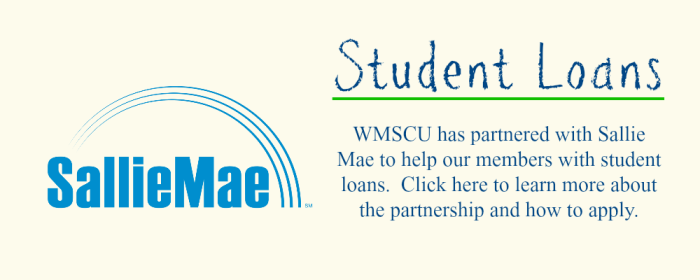
Navigating the world of student loans can be daunting, but understanding your options is key to a successful educational journey. This guide provides a thorough examination of Metro Credit Union’s student loan offerings, covering eligibility requirements, interest rates, repayment plans, and the application process. We’ll delve into the specifics, comparing Metro Credit Union’s programs to those of other institutions to help you make an informed decision.
From understanding eligibility criteria and interest rates to exploring various repayment options and navigating the application process, we aim to equip you with the knowledge necessary to confidently pursue your educational goals with Metro Credit Union’s student loan programs. We’ll also address common concerns and provide real-world examples to illustrate the practical implications of different choices.
Metro Credit Union Student Loan Eligibility Requirements

Securing a student loan can be a significant step towards achieving your educational goals. Understanding the eligibility requirements is crucial for a smooth application process. Metro Credit Union Artikels specific criteria to determine loan eligibility, focusing on factors like academic performance, credit history, and financial stability. Let’s explore these requirements in detail.
Eligibility Criteria for Metro Credit Union Student Loans
Eligibility for Metro Credit Union student loans depends on several factors. While specific requirements may vary based on the type of loan and the applicant’s circumstances, generally, applicants need to be enrolled or accepted for enrollment in an eligible educational program at an accredited institution. A minimum GPA might be required, although this is not always explicitly stated and varies based on the specific loan program. A strong credit history, while beneficial, isn’t always mandatory, particularly for undergraduate students, as co-signers are often an option. Income verification is a standard part of the application process to assess the applicant’s ability to repay the loan.
Comparison of Undergraduate and Graduate Student Loan Programs
The eligibility criteria can differ between undergraduate and graduate student loan programs. While both programs typically require enrollment in an eligible educational program, the emphasis on credit history and income verification might be more pronounced for graduate students due to the generally higher loan amounts involved.
| Feature | Undergraduate Student Loans | Graduate Student Loans |
|---|---|---|
| Minimum GPA | May vary; often not explicitly required. | May be higher; check specific program requirements. |
| Credit History | Not always required; co-signer often acceptable. | Generally more heavily weighted; a strong credit history is beneficial. |
| Income Verification | Required; may include tax returns, pay stubs, or bank statements. | Required; more rigorous verification may be necessary due to higher loan amounts. |
| Co-signer | Often an option to help secure approval. | May be required depending on credit history and income. |
Income Verification Process
Metro Credit Union requires income verification to assess the applicant’s repayment capacity. This process typically involves providing documentation such as tax returns, pay stubs, or bank statements. The specific documents required may vary depending on the applicant’s employment status and income source. For self-employed individuals, additional documentation, such as business tax returns, may be necessary. The purpose of this verification is to ensure that the applicant has the financial means to manage loan repayments without undue hardship. Failure to provide sufficient documentation may delay or prevent loan approval.
Interest Rates and Fees Associated with Metro Credit Union Student Loans
Understanding the interest rates and fees associated with your student loan is crucial for effective financial planning. This section will provide a clear overview of the costs involved with Metro Credit Union student loans, allowing you to make informed decisions about your borrowing. We’ll also offer a comparison with other major financial institutions to help you assess the overall value proposition.
Metro Credit Union Student Loan Interest Rates
Metro Credit Union offers a range of student loan products, each with its own interest rate structure. These rates can vary depending on factors such as the loan type (fixed or variable), creditworthiness of the borrower, and prevailing market conditions. Fixed rates remain constant throughout the loan term, providing predictability, while variable rates fluctuate based on an underlying index, potentially leading to lower initial payments but increased uncertainty over time. Specific rate information is best obtained directly from Metro Credit Union, as rates are subject to change. It’s recommended to contact them or check their website for the most up-to-date figures. For example, a fixed-rate loan might offer a rate of 6.5% APR, while a variable-rate loan might start at 5.0% APR, but this is just an example and may not reflect current rates.
Fees Associated with Metro Credit Union Student Loans
Several fees may be associated with Metro Credit Union student loans. Understanding these fees is vital to accurately budgeting for repayment. The following table provides a general overview; however, it is essential to verify the exact fees with Metro Credit Union, as they are subject to change.
| Fee Type | Description | Amount (Example) | Notes |
|---|---|---|---|
| Origination Fee | A fee charged for processing the loan application. | $100 | May vary depending on loan amount. |
| Late Payment Fee | A fee charged for late or missed payments. | $25 | Specific amount and policy vary; check with Metro Credit Union. |
| Prepayment Penalty | A fee charged for paying off the loan early. | None (Example – Many lenders waive this now) | Check loan agreement for specifics; many loans no longer have this. |
| Returned Payment Fee | A fee charged if a payment is returned due to insufficient funds. | $30 | This is a common fee across many financial institutions. |
Comparison with Other Major Financial Institutions
Comparing interest rates and fees across different financial institutions is essential for securing the most favorable student loan terms. Other major banks and credit unions often offer competitive rates and fee structures. However, the specific terms will vary depending on the lender, the borrower’s creditworthiness, and the type of loan. For instance, a national bank might offer a slightly lower interest rate but charge a higher origination fee, while a smaller credit union might have a slightly higher rate but waive certain fees. A thorough comparison of offers from multiple institutions is recommended to find the best fit for individual needs. This often involves checking the APR (Annual Percentage Rate) which factors in interest and fees to give a more complete picture of the loan’s overall cost.
Repayment Options and Plans for Metro Credit Union Student Loans
Choosing the right repayment plan for your Metro Credit Union student loan is crucial for managing your finances effectively and avoiding unnecessary interest charges. Understanding the various options available allows you to tailor your repayment schedule to your post-graduation income and financial goals. This section Artikels the key repayment plans offered and provides examples to illustrate the differences in monthly payments and total interest paid.
Metro Credit Union likely offers several repayment plans to accommodate varying financial situations. While specific details may vary, common options include standard repayment, graduated repayment, and extended repayment. Each plan differs in its monthly payment amount and the total interest paid over the loan’s life. Selecting the best option depends on your individual circumstances and financial projections.
Standard Repayment Plan
The standard repayment plan typically involves fixed monthly payments over a set period, usually 10 years. This approach offers predictable budgeting and generally results in the lowest total interest paid due to the shorter repayment term. However, the monthly payments may be higher compared to other plans.
Graduated Repayment Plan
A graduated repayment plan features lower monthly payments initially, which gradually increase over time. This option can be beneficial for recent graduates who may have lower incomes immediately after completing their studies. The lower initial payments ease the financial burden in the early years, but the total interest paid will likely be higher than with a standard repayment plan due to the longer repayment period.
Extended Repayment Plan
Extended repayment plans stretch the repayment period over a longer timeframe, resulting in lower monthly payments. This can provide significant short-term relief, but it also leads to a substantially higher total interest paid over the loan’s life. This option is generally considered only when other repayment options prove financially unmanageable.
Repayment Plan Comparison
The following table illustrates a comparison of monthly payments and total interest paid under different repayment plans, using hypothetical loan amounts. Remember that these are examples and actual figures will depend on the specific loan amount, interest rate, and repayment plan chosen. It’s crucial to consult your loan agreement and Metro Credit Union directly for accurate figures related to your loan.
| Loan Amount | Standard Repayment (10 years) | Graduated Repayment (15 years) | Extended Repayment (20 years) |
|---|---|---|---|
| $10,000 | Approx. $100/month, Approx. $2000 total interest (example) | Approx. $70/month, Approx. $4000 total interest (example) | Approx. $55/month, Approx. $6000 total interest (example) |
| $20,000 | Approx. $200/month, Approx. $4000 total interest (example) | Approx. $140/month, Approx. $8000 total interest (example) | Approx. $110/month, Approx. $12000 total interest (example) |
Calculating Total Loan Cost
The total cost of a student loan is the sum of the principal loan amount and the total interest paid over the repayment period. This can be calculated using the following formula:
Total Loan Cost = Principal Loan Amount + Total Interest Paid
For example, a $10,000 loan with $2,000 in total interest paid under a standard repayment plan would have a total cost of $12,000. The total interest paid varies significantly depending on the chosen repayment plan, highlighting the importance of carefully considering each option before making a decision.
Application Process and Required Documentation for Metro Credit Union Student Loans

Applying for a Metro Credit Union student loan is a straightforward process designed to help students secure the funding they need for their education. The application itself is primarily handled online, offering convenience and efficiency. However, gathering the necessary documentation beforehand is crucial for a smooth and timely application review.
The application process involves several key steps, and having all required documentation ready will expedite the approval process. Failing to provide complete documentation can lead to delays.
Step-by-Step Application Guide
The application process for a Metro Credit Union student loan generally follows these steps: First, you’ll need to pre-qualify online, which involves providing some basic personal and financial information. This step helps determine your eligibility and provides an estimate of potential loan amounts and interest rates. Next, you’ll complete the full online application, providing more detailed information about your educational goals, financial situation, and co-signer (if applicable). Following the online application, Metro Credit Union will review your application and supporting documentation. Once approved, you’ll receive a loan offer outlining the terms and conditions. Finally, you’ll need to electronically sign the loan documents to finalize the process and receive your loan disbursement.
Required Documentation
To successfully apply for a Metro Credit Union student loan, you’ll need to provide several key documents. These documents verify your identity, financial stability, and enrollment in an eligible educational program. Incomplete documentation will delay the processing of your application.
Checklist of Required Documents
- Completed Application Form: This is the online application form provided by Metro Credit Union, completely filled out and submitted electronically.
- Government-Issued Photo Identification: A valid driver’s license, passport, or state-issued ID card is required to verify your identity.
- Social Security Number: Your Social Security Number is essential for processing your application and managing your loan account.
- Proof of Enrollment: This could be an acceptance letter from your college or university, a current student ID card, or a transcript showing current enrollment.
- Financial Information: This may include tax returns, pay stubs (if applicable), bank statements, and other documents demonstrating your financial stability. This helps Metro Credit Union assess your ability to repay the loan.
- Co-signer Information (if applicable): If you require a co-signer, they will also need to provide similar documentation, including their government-issued ID, Social Security Number, and financial information.
Benefits and Drawbacks of Choosing Metro Credit Union for Student Loans

Choosing a student loan lender is a significant financial decision impacting a student’s future. Metro Credit Union, like any lender, presents both advantages and disadvantages that prospective borrowers should carefully consider before applying. This section will explore these aspects, comparing Metro Credit Union’s offerings to those of other lenders and examining the potential long-term effects on a borrower’s financial health.
This analysis considers factors like interest rates, fees, customer service, and repayment options to provide a balanced perspective on the benefits and drawbacks of using Metro Credit Union for student loans. The information presented here should be used in conjunction with individual financial circumstances and research into other lending institutions.
Customer Service Experiences with Metro Credit Union Student Loans
Understanding the experiences of previous borrowers provides valuable insight into a lender’s reliability and responsiveness. While individual experiences can vary, analyzing collective feedback helps create a more comprehensive picture.
- Positive Experiences: Many students report positive experiences with Metro Credit Union’s customer service, citing helpful and responsive staff who are readily available to answer questions and address concerns. Some praise the personalized attention and the ease of communication through various channels, such as phone, email, and online portals. These positive reviews often highlight the proactive approach of Metro Credit Union’s representatives in guiding borrowers through the application and repayment processes.
- Negative Experiences: Conversely, some borrowers have reported challenges in contacting customer service representatives or experiencing delays in resolving issues. A few negative reviews mention difficulties navigating the online portal or a lack of clarity in certain aspects of the loan agreement. These negative experiences, while less frequent, emphasize the importance of thorough research and careful consideration before committing to a loan.
Comparison with Other Lenders
Comparing Metro Credit Union’s student loan offerings to those of other lenders, such as national banks or private loan companies, is crucial for making an informed decision. This comparison should include interest rates, fees, repayment options, and customer service.
- Potential Advantages: Metro Credit Union may offer lower interest rates compared to some private lenders, especially for members with strong credit history or those who participate in their member rewards programs. They might also provide more flexible repayment options or offer personalized financial guidance. The potential for building a relationship with a local credit union could also be beneficial in the long run.
- Potential Disadvantages: Metro Credit Union’s loan availability might be geographically limited compared to national lenders. Their loan amounts and eligibility criteria may also be stricter than some private lenders, potentially excluding some students from accessing the necessary funds. Interest rates, while potentially competitive, may not always be the lowest available in the market.
Long-Term Financial Health Impact
The choice of a student loan lender significantly impacts a borrower’s long-term financial health. Understanding the potential implications is essential for responsible borrowing.
Borrowing from Metro Credit Union, like any loan, will increase a student’s debt burden. However, lower interest rates and flexible repayment plans can help mitigate the long-term financial strain. For example, a student securing a loan with a 5% interest rate from Metro Credit Union will pay significantly less interest over the life of the loan compared to a loan with a 10% interest rate from a private lender. Careful budgeting, responsible repayment, and early repayment strategies can further improve long-term financial outcomes. Conversely, failing to manage repayments effectively can lead to credit score damage and financial difficulties. A realistic budget and a well-defined repayment plan are crucial for minimizing the long-term financial impact of student loan debt.
Illustrative Examples of Metro Credit Union Student Loan Scenarios
These examples illustrate potential scenarios when applying for and managing student loans through Metro Credit Union. Remember that specific terms and conditions may vary, so it’s crucial to consult the most up-to-date information from Metro Credit Union directly.
Undergraduate Student Loan Application and Repayment
This scenario follows a hypothetical undergraduate student, Sarah, applying for a $10,000 student loan to cover her tuition and living expenses.
First, Sarah completes the online application, providing necessary documentation such as her acceptance letter, transcripts, and financial aid award letter. She also submits her parent’s tax returns since she is applying as a dependent student. After a thorough review of her application and credit history (or her co-signer’s credit history if required), Metro Credit Union approves her loan within two weeks. The loan is disbursed directly to her university in accordance with the university’s disbursement schedule. Sarah chooses a standard 10-year repayment plan with a fixed interest rate of 6%. Her monthly payment, calculated based on the loan amount, interest rate, and repayment term, comes to approximately $111. This payment remains consistent throughout the loan’s duration. Sarah diligently makes her monthly payments on time, ensuring she avoids late fees and maintains a good credit history. Upon completing the repayment period, her loan is successfully paid off.
Impact of Different Repayment Plans on Graduate Student Loan Cost
This scenario examines the cost differences between repayment plans for a $20,000 graduate student loan taken out by John.
John, a graduate student, secures a $20,000 loan from Metro Credit Union. He considers two repayment options: a standard 10-year plan and an extended 15-year plan. Both plans carry a fixed interest rate of 7%. With the 10-year plan, his monthly payment is approximately $240, leading to a total repayment of approximately $28,800, including interest. The 15-year plan results in a lower monthly payment of roughly $180, but the total repayment increases to approximately $32,400 due to the extended repayment period and accumulated interest. This demonstrates how choosing a longer repayment plan can lower monthly payments but ultimately increase the total cost of the loan.
Student Loan Application with a Co-Signer
This scenario highlights the role of a co-signer in the loan application process.
Michael, a student with limited credit history, needs a co-signer to secure a $15,000 student loan. His parents agree to co-sign. The application process involves submitting the standard documentation along with the co-signer’s financial information, including credit report and income verification. Metro Credit Union reviews both Michael’s and his co-signer’s creditworthiness before approving the loan. The co-signer’s strong credit history significantly improves the likelihood of loan approval and may result in a lower interest rate for Michael. Should Michael default on his loan payments, his co-signer becomes responsible for the remaining balance. The co-signer’s involvement affects the approval process, but it increases the chances of securing the loan, especially for students with limited or no credit history.
Closing Summary
Securing student loans is a significant financial undertaking. By carefully considering the information presented in this guide, prospective borrowers can make well-informed decisions about financing their education through Metro Credit Union. Remember to thoroughly compare options, understand the terms and conditions, and plan for responsible repayment to ensure a positive and financially sound experience. Choosing the right loan can significantly impact your future financial well-being; take the time to explore all your possibilities.
Q&A
What is the minimum credit score required for a Metro Credit Union student loan?
Metro Credit Union’s credit score requirements vary depending on the applicant’s circumstances and the loan type. It’s best to contact them directly to determine the specific requirements for your situation.
Can I refinance my existing student loans with Metro Credit Union?
Metro Credit Union may offer student loan refinancing options; however, eligibility criteria will apply. Contact them directly to inquire about refinancing possibilities.
What happens if I miss a student loan payment?
Missing a payment will likely result in late fees and negatively impact your credit score. Contact Metro Credit Union immediately if you anticipate difficulty making a payment to explore possible solutions.
Does Metro Credit Union offer loan forgiveness programs?
Metro Credit Union doesn’t directly offer loan forgiveness programs. Loan forgiveness is typically tied to specific government programs and not the lending institution.
